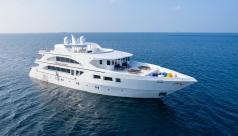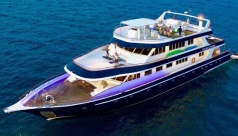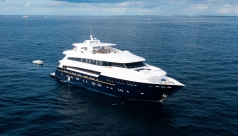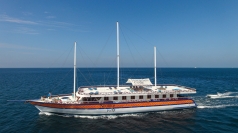Beaches
For sun, sea and sand perfection, the Maldives is unmatched - 99% of its territory is water, with the remaining 1% featuring breathtaking beach scenery, including countless sandbars and uninhabited islands with picture-perfect shores. Some of the finest are accessible through liveaboard trips. These cruises frequently feature island barbecues on completely deserted islands, offering that perfect "away from it all" feeling as you walk along pristine white sands untouched by footprints.
While the atolls are dotted with incredible beaches, the capital Malé has limited natural shorelines. However, its artificial beach serves as a vibrant social hub, especially in late afternoons, where locals and visitors enjoy swimming, sunbathing, water sports, and entertainment like live music and carnivals. Nearby Hulhumalé island complements Malé with long white beaches lined with palms and a central park for strolling.
Water Sports & Marine Activities
The Maldives offers world-class surfing thanks to consistent Indian Ocean swells, with 2 main areas: North Malé Atoll and the outer atolls (450 km to the south). The surf season runs mid-February through November (peaking March-April), coinciding with ideal diving conditions.
Most visitors spend their time diving and island-hopping, while resorts provide abundant aquatic activities like parasailing, kitesurfing, wakeboarding, catamaran sailing and sea kayaking.
Cultural & Historical Attractions
Malé's cultural gems include the National Museum, housed in the old Sultan's Palace, displaying artefacts from colonial and pre-colonial eras - from royal antiquities to Thor Heyerdahl's archaeological finds and intricate stone carvings (open Saturday-Thursday). The 1906 Mulee-aage Palace, now the presidential office, contains tombs of Maldivian saints. The impressive Friday Mosque (Masjid-al-Sultan Mohammed Thakurufaanu-al-Azzam), the nation's largest, accommodates 5,000 worshippers and features stunning minarets and domes alongside national heroes' tombs.
Local Markets & Daily Life
For authentic local experiences, visit Malé's vibrant fish market on the waterfront - a sensory explosion of colours, sounds and smells. Nearby firewood and fruit bazaars offer further glimpses into Maldivian daily life.
For more travel ideas, visit
The Maldives Tourism Board website.











































